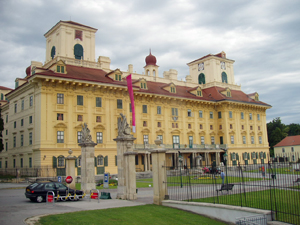Conductor’s Notes

Our concert in December was rather special because we performed music that was very specific to Scotland, including two works commissioned by the choir. For this concert we are off to Austria for music from the classical period. And to go one better than the December concert, all three works in tonight’s programme are commissions. Compositions paid for by a very generous patron of the arts.
Prince Nicolaus II Esterházy, was head of one of the wealthiest and most powerful Hungarian noble families. He was devoted to music and was very generous in his support of the arts. His remote country estate boasted two theatres and two large, sumptuously appointed music rooms.
In 1761 Haydn was taken in to the service and remained there for 30 years. The Harmoniemesse was commissioned by Nicolaus II, the fourth of the Esterhazy Princes whom Haydn had served, for the name day of Princess Maria Josepha Hermenegild. It was completed in 1802 and was Haydn’s last major work. It was written when he was 70 years old and at the height of his creative powers. So perhaps this piece is to Haydn what the B Minor Mass is to Bach – the final summation of an artistic life.
In 1804 Haydn recommended Hummel for the new post of Konzertmeister at the Court of Prince Esterházy, where he stayed for seven years. Settings of the Te Deum in the Austrian tradition of liturgical music were often prompted by particular events such as a birthday, recovery from an illness, a return from a long journey, the signing of a peace treaty, and so on. Hummel’s Te Deum, his only setting of the text, was first performed on 1 January 1806 in response to the signing of the Peace of Pressburg in December 1806.
Although Beethoven wasn't in the employ of the Esterházys, he was invited to compose a mass for the name day of the Princess. His Mass in C was first performed on 13th September 1807. He had composed his mass in quite a different way than Haydn and that is probably why it was not well received by the prince. Nevertheless, Beethoven had a high opinion of this work. By breaking away from the typical 18th century liturgical form of the mass setting he was now able to impart to his church music the sense of conviction and ethical-religious expressive concepts so deeply rooted within him.
The Bach Choir last sang Haydn’s Harmoniemesse some 30 years ago. However, tonight the choir will be singing music by Hummel and his rather more famous peer Beethoven for the first time.
Gordon Jack, Musical Director